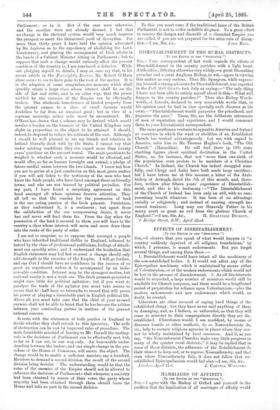EFFECTS OF DISESTABLISHMENT.
[To THE EDITOR OF THE " SPECTATOR.'1
Sta,—I observe that you speak of what would happen in "a country suddenly deprived of all religious foundations," by which, I presume, is meant endowments. But you forget several things, and among them these :—
1. Disestablishment would leave intact all the machinery of the non-established bodies. 2. It would not affect any of the Episcopalian machinery which is maintained by means either of Voluntaryism, or of the modern endowments which would not be lost in the process of disendowment. 3. As all life-interests would be respected, a large number of ministers would still be available for Church purposes, and there would be a lengthened period of preparation for reliance upon Voluntaryism,—plus the modern endowments and new endowments which would, no doubt, be created.
Liberators are often accused of saying hard things of the established clergy ; but they have never said anything of them so damaging, and, as I believe, so unfounded, as that they will cease to minister to their congregations directly they are disestablished. Churchmen would, I am confident, by means of diocesan boards or other methods, do as Nonconformists do, viz., help to sustain religious agencies in places where they cannot be wholly maintained by local resources. And if, as you say, "the Nonconformist Churches make very little progress in many of the quieter rural• districts," it may be replied that in some of those districts, the adherents of the Establishment do their utmost to keep out, or to repress, Nonconformity, and that even where Nonconformity fails, it does not follow that nuestablished Episcopalianism would fail also.—I am, Sir, &c.,
London, April 21st. J. CARVELL WILLIAMS. — —


































 Previous page
Previous page